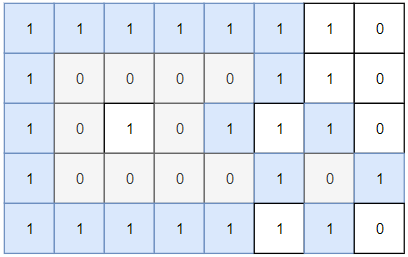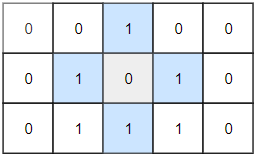题目如下:
Given a 2D
gridconsists of0s(land) and1s(water). An island is a maximal 4-directionally connected group of0sand a closed island is an island totally (all left, top, right, bottom) surrounded by1s.Return the number of closed islands.
Example 1:
Input: grid = [[1,1,1,1,1,1,1,0],[1,0,0,0,0,1,1,0],[1,0,1,0,1,1,1,0],[1,0,0,0,0,1,0,1],[1,1,1,1,1,1,1,0]] Output: 2 Explanation: Islands in gray are closed because they are completely surrounded by water (group of 1s).Example 2:
Input: grid = [[0,0,1,0,0],[0,1,0,1,0],[0,1,1,1,0]] Output: 1Example 3:
Input: grid = [[1,1,1,1,1,1,1], [1,0,0,0,0,0,1], [1,0,1,1,1,0,1], [1,0,1,0,1,0,1], [1,0,1,1,1,0,1], [1,0,0,0,0,0,1], [1,1,1,1,1,1,1]] Output: 2Constraints:
1 <= grid.length, grid[0].length <= 1000 <= grid[i][j] <=1
解题思路:典型的BFS/DFS的场景,没什么好说的。
代码如下:
class Solution(object): def closedIsland(self, grid): """ :type grid: List[List[int]] :rtype: int """ visit = [[0] * len(grid[0]) for _ in grid] res = 0 for i in range(len(grid)): for j in range(len(grid[i])): if grid[i][j] == 1 or visit[i][j] == 1:continue queue = [(i,j)] visit[i][j] = 1 closed = True while len(queue) > 0: x,y = queue.pop(0) if x == 0 or x == len(grid) - 1 or y == 0 or y == len(grid[0]) - 1: closed = False direction = [(0,1),(0,-1),(1,0),(-1,0)] for (x1,y1) in direction: if x + x1 >= 0 and x + x1 < len(grid) and y + y1 >= 0 and y + y1 < len(grid[0]) and visit[x+x1][y+y1] == 0 and grid[x+x1][y+y1] == 0: queue.append((x+x1,y+y1)) visit[x+x1][y+y1] = 1 if closed:res += 1 return res

